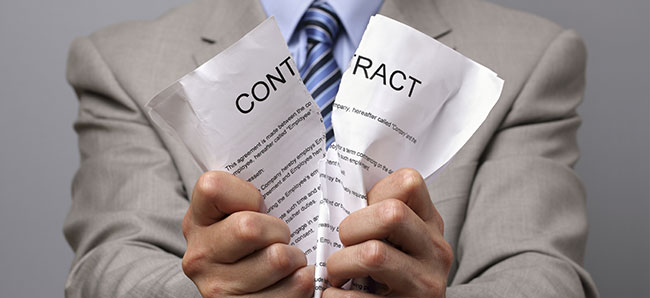Here at Law 4 Small Business, we write a lot about contracts. We write about attempting to predict the future through contracts. We write about key contract dates. And yes, we write about how to get out of a contract .
Many small business owners and entrepreneurs find themselves needing to get out of a contract. And in spite of how common this issue is, most business owners fail to understand how they get into the situation in the first place. Breaking a contract is neither easy, nor cheap- largely due to what is known as the parol evidence rule. ‘Empty Promises’ and ‘Substandard Service’ are NOT considered valid reasons to break a contract.
Parol Evidence Rule
Let’s simplify that. Contracts may not (in general) be contradicted by other evidence. In contract law, this is called “the parol evidence rule.” This rule prevents the introduction of additional evidence to a contract. In other words, prior negotiations do not apply. Current negotiations do not apply. Oral negotiations do not apply. For the most part, anything not in writing is not valid. A contract is intended to be a complete and final expression of the parties’ agreement.
Empty Promises
Have you ever encountered an offer that just seems “too good to be true?” They usually go like this: lots of promises of support and success, pressure to sign quickly or lose the opportunity forever, lots of upfront cash and/or commitment, little to no details of the promises make it into the contract. This type of marketing is often seen in Franchise Agreements.
Unless promises are in the contract before you sign it, they are literally worthless.
Usually, such contracts are professionally written by lawyers representing the other side. They contain “merger clauses” which is a legal term to mean specific language in a contract that “strengthens the presumption that the written document is complete and final by expressly stating that the written document is the final and full expression of the parties’ agreement.” In other words, you cannot raise the issues of promises of support and success to terminate a contract, unless those promises are in writing.
Substandard Services
Too many businesses fall into the trap of signing long-term commitments with vendors who end up providing substandard services — leaving a business stuck in a contract that costs too much and delivers little of value to the business. However, unless service standards are spelled out, your business has no grounds to cancel the contract.
It’s common for service provides (ex: landlords, web developers, SEO Providers) to attempt to lock their clients into long-term contracts and then provide substandard services. Two examples of this are reflected in our “Don’t Get Screwed” series: Commercial Leases: Avoid Getting Screwed and Don’t Get Screwed – Managing Website Vendors.
The trick is to make sure key metrics or goals are contained within the contracts before you sign. Read our article about S.M.A.R.T. Goals are Smart to Have for suggestions on writing effective goals in your contracts.
Never Sign a Contract, Unless All Important Issues Are Addressed
NEVER SIGN A CONTRACT unless it contains the complete understanding of the arrangement or deal. Ask yourself “What could go wrong?” and “What would make me want to terminate this contract?”. Think of the parol evidence rule when ironing out issues and circumstances in the contract. NEVER, EVER take someone at their word because their word is meaningless if you’re trying to defend yourself in a breach of contract lawsuit.
Finally, before you sign an important contract, especially a commercial lease, have your business attorney review it. At Law 4 Small Business, we have a Limited Flat-Rate Contract Review for only $20/page (minimum of 5 pages, even if the contract is less than 5 pages).

